Overview
The article titled "10 Strategies to Prevent Software Errors in Development" addresses the significant challenges developers encounter in minimizing software errors throughout the development process. It offers insights into various strategies, such as:
- Automated debugging
- Real-time monitoring
- Comprehensive testing
- Adherence to coding standards
These methods collectively improve code quality and reduce the frequency of errors in software applications. Furthermore, how can developers effectively implement these strategies? Kodezi emerges as a solution, providing specific features that cater to these needs. By leveraging Kodezi, developers can enhance their productivity and achieve higher code quality, ultimately leading to more reliable software outcomes. Are you ready to explore the tools available on the platform and elevate your coding practices?
Introduction
In the dynamic realm of software development, the battle against bugs and errors is a constant struggle that can significantly impact productivity and user experience. Have you ever felt overwhelmed by the challenges of coding? As developers strive for excellence, leveraging advanced tools and methodologies becomes imperative to enhance code quality and streamline workflows. Kodezi, with its automated debugging solutions and comprehensive testing strategies, addresses these challenges head-on. This platform is rich with resources designed to tackle the most prevalent software issues.
By utilizing Kodezi, developers can not only identify and rectify errors swiftly but also cultivate a culture of quality and efficiency in their coding practices. Imagine the benefits of improved productivity and enhanced code quality—how much more could you achieve? As the industry evolves, understanding and implementing these innovative strategies will be crucial for teams aiming to deliver robust and reliable software solutions. Explore the tools available on Kodezi and empower your development journey.
Kodezi | Professional OpenAPI Specification Generator - AI Dev-Tool: Automate Code Debugging to Prevent Errors
Coding challenges are an inevitable part of a developer's journey. How often have you found yourself stuck on debugging issues? The automated code debugging capability, powered by its CLI, addresses these common pain points by enabling programmers to quickly pinpoint and resolve issues within their codebases. Kodezi provides thorough clarifications of issues and their solutions, allowing developers to learn from their missteps and improve their coding techniques.
This proactive approach conserves valuable time and significantly elevates overall code quality. Research shows that automated debugging tools can decrease program mistakes by as much as 30%. This statistic highlights the significance of Kodezi in contemporary development settings. Furthermore, teams utilizing the CLI tool, often referred to as the Swiss-Army Knife for developers, have reported notable enhancements in productivity and code dependability.
Isn't it time to transform your coding experience? By integrating Kodezi into your workflow, you can reduce software errors and improve your team's efficiency. To get started, check out our 5-minute quickstart and see a demo to explore how Kodezi can revolutionize your coding practices.
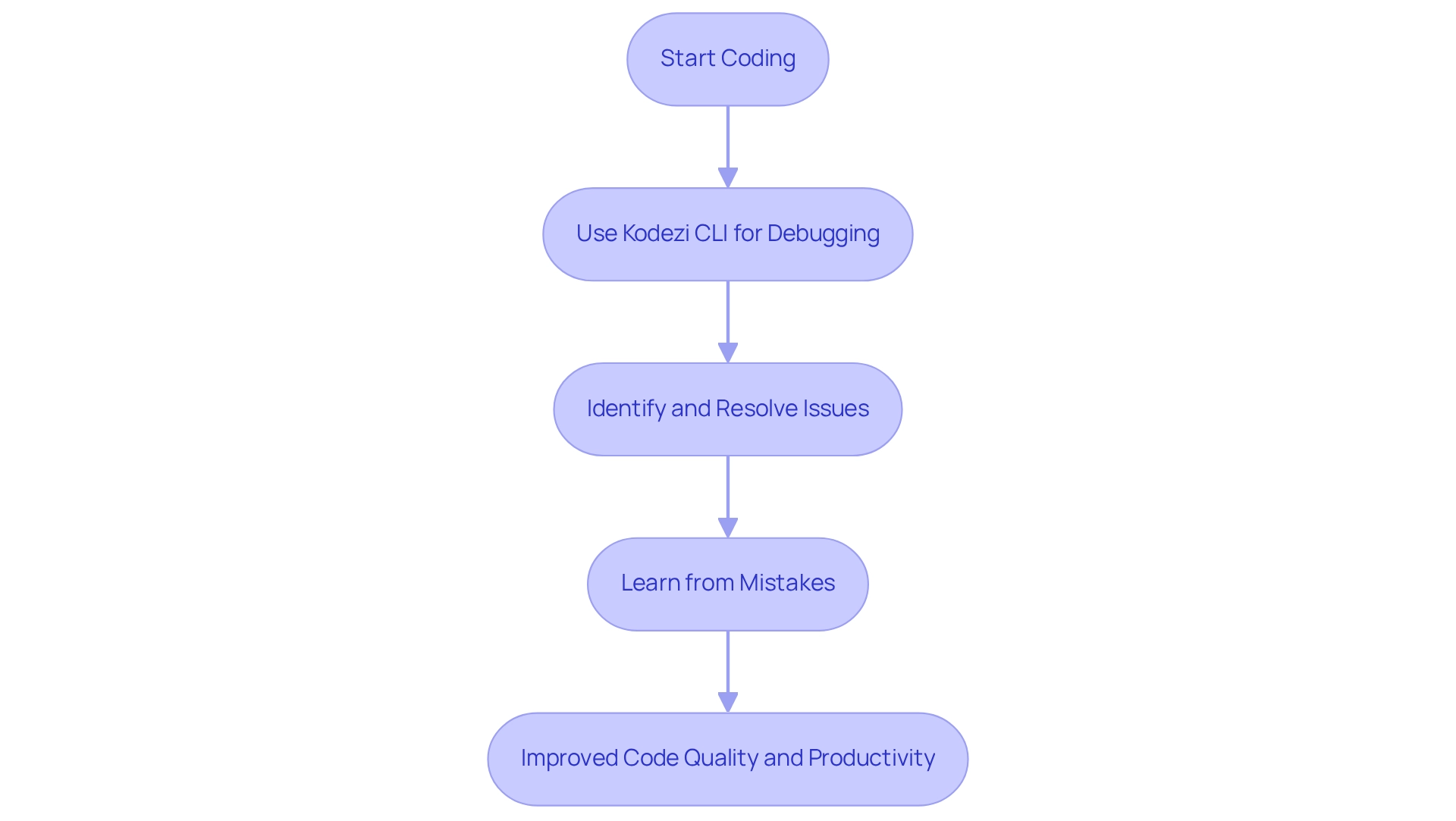
Bugsnag: Enhance Application Insights to Minimize Software Errors
Developers often face significant coding challenges, particularly when it comes to monitoring and resolving application issues. Bugsnag offers robust application monitoring tools that enable real-time issue tracking, allowing teams to capture detailed reports and user session data. This data-focused approach empowers developers to prioritize solutions based on user impact, ultimately enhancing application stability and user experience.
Research indicates that organizations employing real-time error monitoring tools experience a notable reduction in software errors. In fact, 70% of programmers report improved application reliability after adopting these tools. As industry leaders emphasize, "Testing is not about finding all the bugs and defects. It's about finding the critical ones that matter."
Furthermore, Bugsnag's automated code debugging feature allows developers to swiftly pinpoint and address codebase problems, providing thorough explanations and insights into the issues encountered and their resolutions. This capability not only facilitates rapid issue resolution but also ensures adherence to the latest security best practices and coding standards.
In addition, a case study on performance testing illustrates how proactive monitoring can identify bottlenecks, ensuring applications perform efficiently and enhancing user satisfaction. By focusing on critical bugs and leveraging real-time insights, Bugsnag helps avert significant software errors, which results in a more stable and user-friendly application.
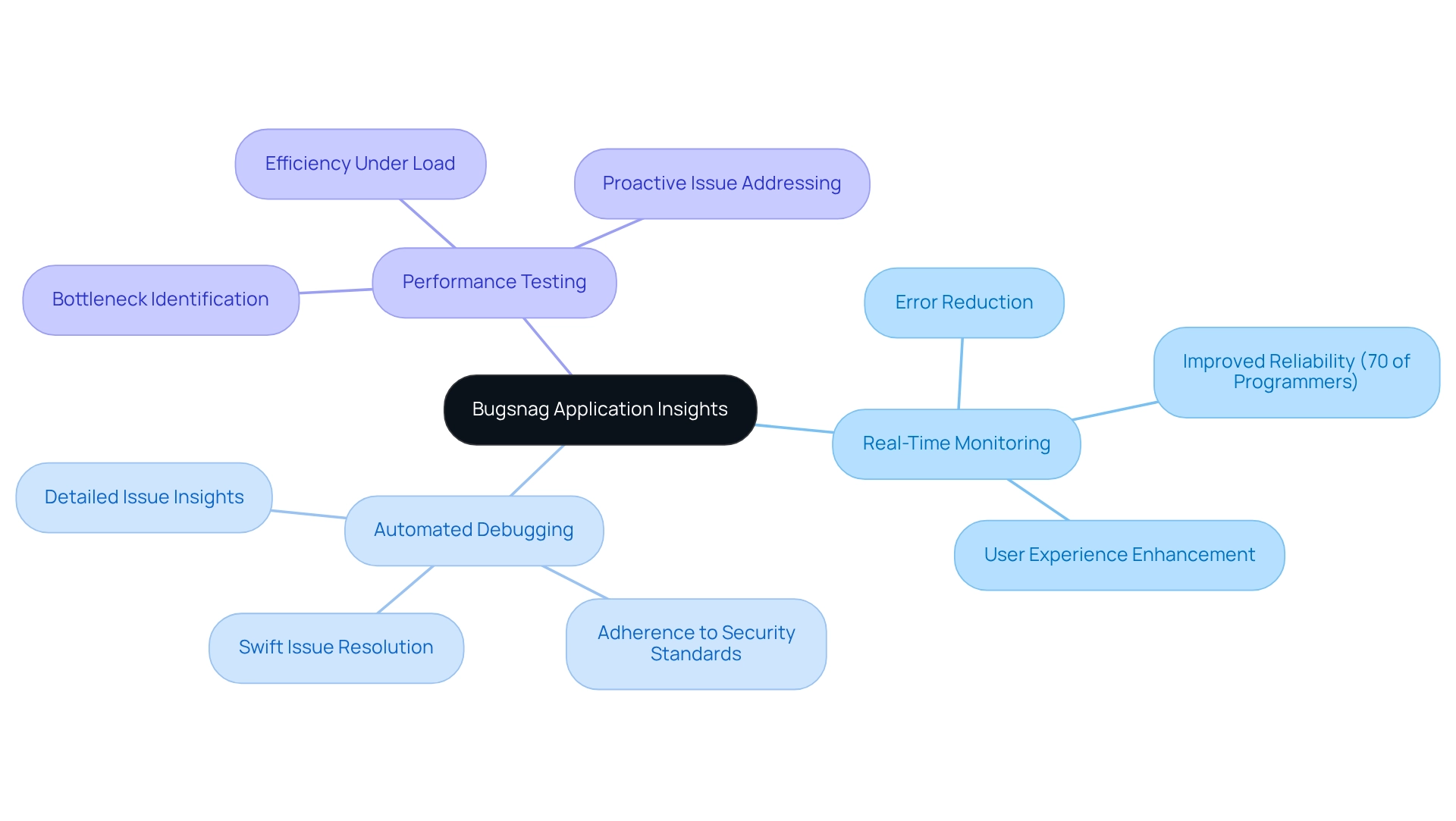
Functionize: Utilize Automated Testing to Detect Bugs Early
Developers often grapple with coding challenges that can result in software errors, hindering their productivity and software quality. The Kodezi platform effectively addresses these issues through its AI-driven automated testing capabilities. By identifying bugs early in the development cycle and autonomously enhancing codebases, Kodezi ensures that potential issues are resolved before deployment. This proactive approach not only conserves valuable time and resources but also significantly elevates software quality by addressing software errors, making it an indispensable tool for developers committed to error prevention.
With a notable 72.3% of organizations prioritizing automation expertise, the importance of such tools continues to grow. The adoption of Kodezi CLI empowers B2B engineering teams to quickly AutoHeal codebases, aligning with the latest security best practices and coding standards.
Furthermore, as organizations are encouraged to integrate testing into their DevOps or SRE workflows by 2025, the emphasis on ongoing testing practices and efficient bug reporting becomes crucial for minimizing software errors and ensuring application longevity. Developers recognize that early bug detection methods are essential for maintaining high standards in application development. This reinforces the effectiveness of AI-driven testing in improving overall project outcomes.
Are you ready to explore how Kodezi can enhance your coding practices? Discover the tools available on the platform and experience the benefits of improved productivity and code quality.
Raygun: Implement Real-Time Error Monitoring to Address Software Issues
Coding challenges can often hinder developers' productivity. However, Raygun's real-time issue monitoring empowers developers to swiftly identify and diagnose problems as they arise. By providing comprehensive reports on issue frequency and user impact, Raygun enables teams to react promptly to application issues, significantly minimizing downtime and enhancing the overall user experience. This proactive approach is essential for maintaining the integrity of applications, allowing for quick responses to critical issues before they escalate.
Furthermore, expert insights underscore the significance of rapid error diagnosis. Engineers have noted that timely interventions can prevent minor issues from evolving into major failures. For instance, Richard Stallman aptly stated, "Fighting patents one by one will never eliminate the danger of technology patents, any more than swatting mosquitoes will eliminate malaria." This highlights the necessity of addressing issues swiftly within the development process.
Real-world examples illustrate how companies utilizing Raygun's monitoring tools have effectively enhanced their software integrity. A compelling case study titled 'Empowering Developers' demonstrates how the platform equips developers with a comprehensive suite of tools designed to streamline the coding process. This includes features such as automated code debugging and performance optimization. With Kodezi CLI, teams can auto-heal codebases in mere seconds, boosting programming productivity while ensuring adherence to security best practices.
In addition, these concrete advantages emphasize the importance of adopting real-time issue monitoring solutions in development processes. By improving application reliability, Raygun not only addresses immediate coding challenges but also fosters a culture of proactive problem-solving among developers.
Sans.org: Learn from the CWE Top 25 Software Errors to Improve Code Quality
Developers often face significant challenges when dealing with software errors that can compromise application security. The CWE Top 25 list highlights the most critical software errors that creators must acknowledge to protect their applications. By analyzing these prevalent vulnerabilities, programmers can adopt best practices that not only mitigate risks of software errors but also significantly enhance the quality of their code. This proactive approach is vital, as it contributes to the overall security of software applications and helps in mitigating software errors, making the CWE Top 25 an indispensable resource for development teams.
Kodezi offers a solution by providing essential tools that assist in identifying and correcting coding errors. For instance, integer overflow vulnerabilities, categorized under CWE-190, can lead to unexpected behaviors when arithmetic operations exceed the maximum limits of integer types. Developers are encouraged to utilize safe arithmetic operations and validate input values to prevent such issues. Instruments like Kodezi can serve an essential purpose here, as it automatically examines issues and offers clarifications, assisting programmers in comprehending and addressing these weaknesses effectively. Unlike Copilot, which focuses on code completion, Kodezi acts as an autocorrect tool, ensuring that coding errors are identified and resolved.
The benefits of using Kodezi are clear. Statistics reveal that awareness of these common vulnerabilities can dramatically improve code quality and help reduce software errors. The continuous upkeep and distribution of the CWE/SANS Top 25 list, as emphasized by security specialists, highlights the importance for all programmers to familiarize themselves with these essential software errors. As Kenneth R. van Wyk from KRvW Associates, LLC, aptly noted, understanding software errors and vulnerabilities is crucial for enhancing the state of security in application development. By leveraging the insights from the CWE Top 25, along with the capabilities of Kodezi, which supports over 30 programming languages and is compatible with various IDEs, individuals can not only avoid common pitfalls but also foster a culture of security and quality within their teams.
To apply these insights efficiently, programmers should consistently examine their code against the CWE Top 25 vulnerabilities and incorporate secure coding practices into their development processes to minimize software errors, ultimately resulting in more robust and dependable solutions.
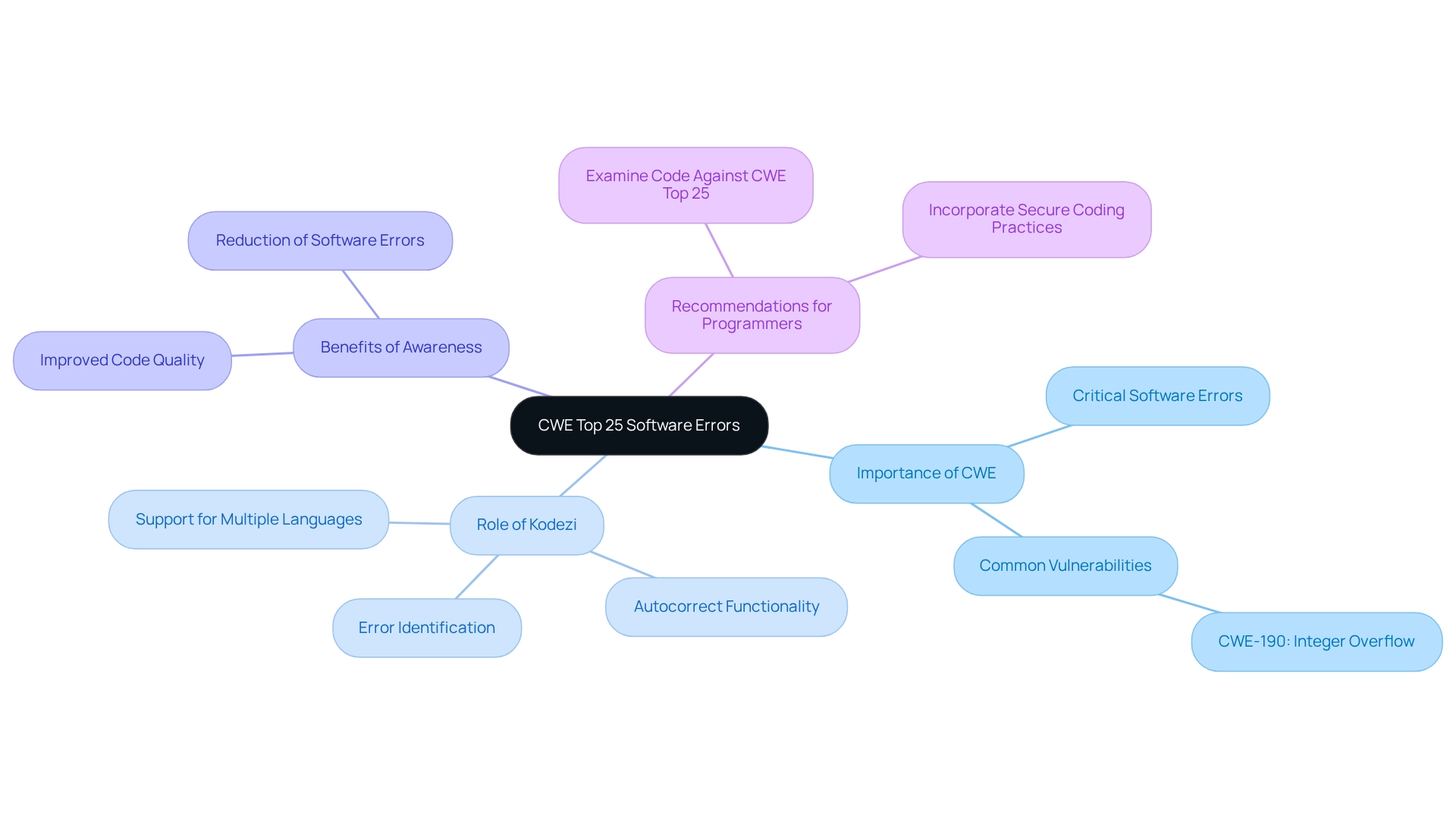
EEWorldOnline: Identify and Avoid Common Software Engineering Errors
Common software errors can significantly hinder development processes in software engineering. Recognizing and addressing these pitfalls is essential for developers. In 2025, statistics indicate that teams employing automated testing and continuous integration experience a 50% reduction in serious bugs. This underscores the importance of proactive measures. Kodezi, a powerful platform, illustrates how automation can boost programming productivity. It independently enhances code quality and resolves bugs prior to reaching production, supporting over 30 programming languages and being compatible with various IDEs, including Visual Studio Code. This versatility addresses diverse coding environments effectively.
Software systems typically do not function well until they have been tested in real applications, highlighting the necessity of thorough testing and quality assurance. Implementing comprehensive code reviews is a critical strategy; projects utilizing such practices report 30% fewer bugs upon release compared to those that do not. To foster a culture of quality and accountability, developers should adhere to established coding standards and engage in regular feedback processes. This approach enhances code quality and boosts workplace satisfaction, as recognizing and rewarding participation correlates with improved team dynamics and motivation. Furthermore, the AI-driven programming tool can assist in this regard by automatically analyzing bugs and providing explanations, facilitating a more efficient review process. Unlike other tools like Copilot, which concentrate on code completion, Kodezi functions as an autocorrect for code, enabling users to automatically debug and resolve coding problems.
Case studies reveal that incorporating gamification elements into review processes can increase participation rates by up to 50%. This creates a more interactive environment that encourages continuous improvement and shared knowledge. By concentrating on these strategies, including utilizing resources like Kodezi, programmers can effectively evade common software errors. This ensures a smoother development cycle and higher-quality outcomes. Explore Kodezi today to enhance your programming efficiency and quality.
Jotform: Understand Different Types of Software Bugs to Enhance Development
Understanding the various types of application bugs—functional, logical, and performance—is essential for developers facing coding challenges. By categorizing these issues, teams can implement targeted strategies for testing and debugging software errors, ultimately leading to more robust and reliable software. Did you know that one computational study may take up to three months to replicate? This statistic underscores the complexity of debugging procedures and the need for efficient tools like CLI to resolve software errors. This tool autonomously enhances codebases and resolves bugs before they reach production, significantly cutting down the time spent on debugging.
Effective categorization streamlines these processes and greatly influences app performance, ultimately helping to minimize software errors and enhance user satisfaction. Real-world scenarios demonstrate how classifying software errors can enhance debugging strategies. Development teams leveraging insights from statistical analyses can enhance their debugging practices, which helps in reducing software errors and results in superior app quality. Automated code debugging features enable teams to swiftly identify and address performance bottlenecks, security vulnerabilities, and software errors, while improving code formatting and ensuring compliance with the latest coding standards. Kodezi CLI also offers detailed explanations and insights into software errors, further assisting developers in understanding and resolving problems.
Experts agree that grasping technical issues is vital for boosting development efficiency. As Samantha Spiro, Content Manager and Chief Editor, stated, "Recognizing the importance of technology development in today's digital era is the initial step toward utilizing its potential for innovation and advancement." By focusing on bug classification and utilizing tools like CLI, developers can significantly enhance their debugging efficiency and reduce software errors, which leads to higher quality outcomes. To fully harness the advantages of automated debugging, teams should routinely assess their debugging strategies and integrate insights from tools like Kodezi CLI into their development processes.
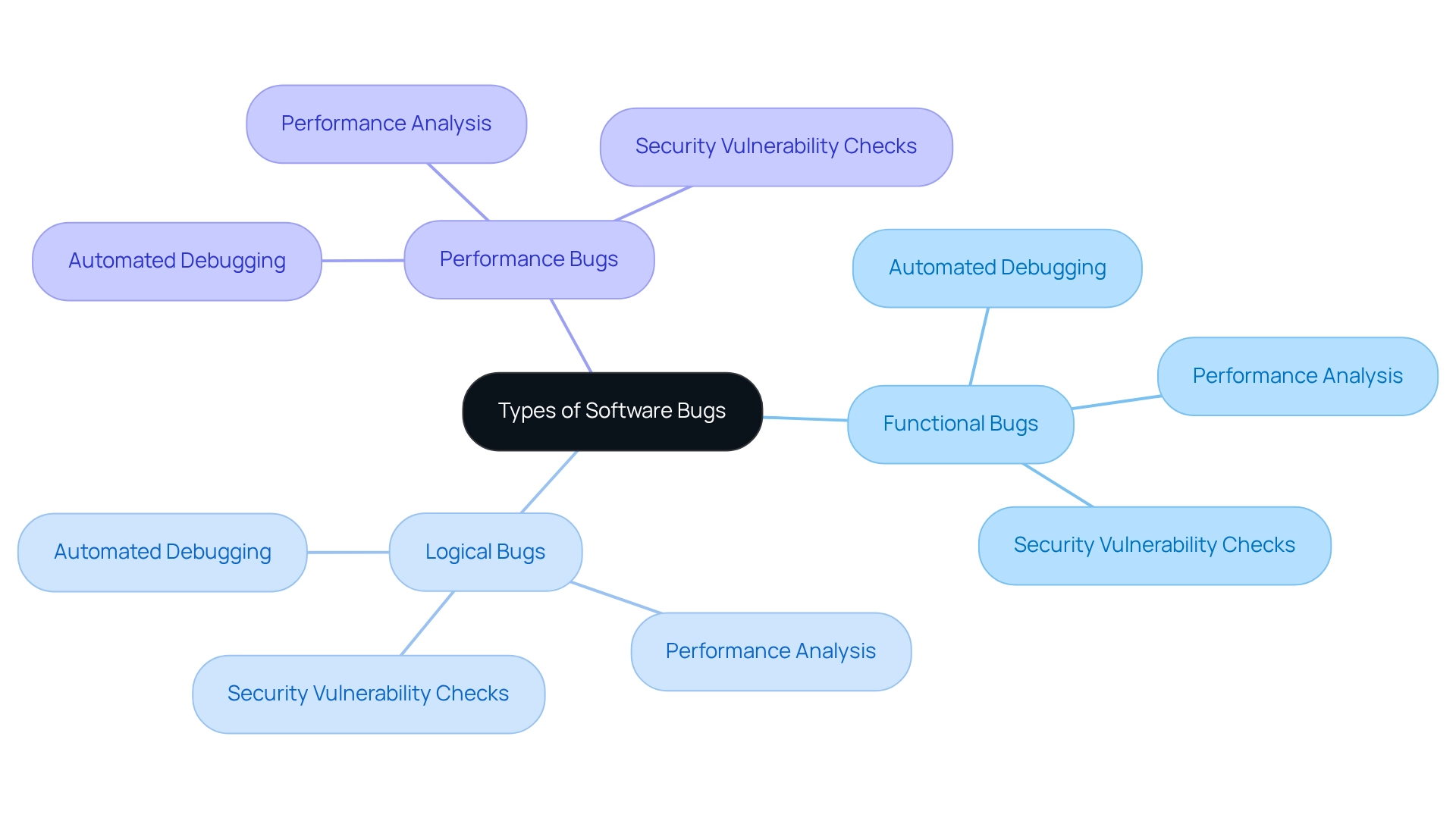
Security Compass: Adopt Best Practices to Prevent Software Development Errors
Implementing best practices in application development is crucial for minimizing errors and enhancing quality. As Drew Houston aptly stated, 'programming is the closest thing we have to a superpower,' which underscores the importance of programming skills and best practices in achieving outstanding results. Development teams should prioritize:
- Regular code reviews
- Adherence to established coding standards
- Continuous integration testing
These foundational strategies not only help identify potential issues early in the development process but also foster a culture of quality and accountability among developers.
Did you know that approximately 31% of businesses are now utilizing automation tools to realize significant cost savings? This statistic highlights the growing recognition of efficiency in development processes. Furthermore, industry leaders stress the importance of coding standards; as Patrick McKenzie points out, great developers often confront challenges they initially feel unprepared to tackle, emphasizing the necessity of a solid grounding in coding practices.
Real-world examples illustrate the effectiveness of these strategies. For instance, the development of the Fame Sport Club mobile application showcased how a cohesive approach to application development can enhance user experience and streamline operations. By integrating features such as court reservations and loyalty incentives, the app not only improved client communication but also set a new benchmark in sports applications, ultimately boosting club engagement.
Moreover, regular code reviews play a vital role in maintaining quality. They enable teams to catch errors before they escalate, ensuring that the final product adheres to high standards. As Karl Wiegers wisely stated, 'The bitterness of poor quality remains long after the sweetness of meeting the schedule has been forgotten.' This sentiment reinforces the need to prioritize quality over mere deadlines.
Looking ahead to 2025, best practices for preventing software errors during development continue to evolve, with an emphasis on integrating automated tools and fostering collaborative environments. Tools equipped with robust debugging capabilities and self-sufficient features are revolutionizing how programmers approach coding challenges. Users have reported that these tools help them identify and fix bugs more swiftly and with less effort than traditional methods, making them invaluable for troubleshooting. One user described Kodezi as 'unlocking a new superpower' for debugging, while another noted its significant contribution to enhancing their engineering team's productivity.
These evolving practices aim to boost efficiency, simplifying the process for developers to produce high-quality applications. By adopting these strategies, development teams can significantly reduce the likelihood of errors, leading to more reliable and effective solutions.
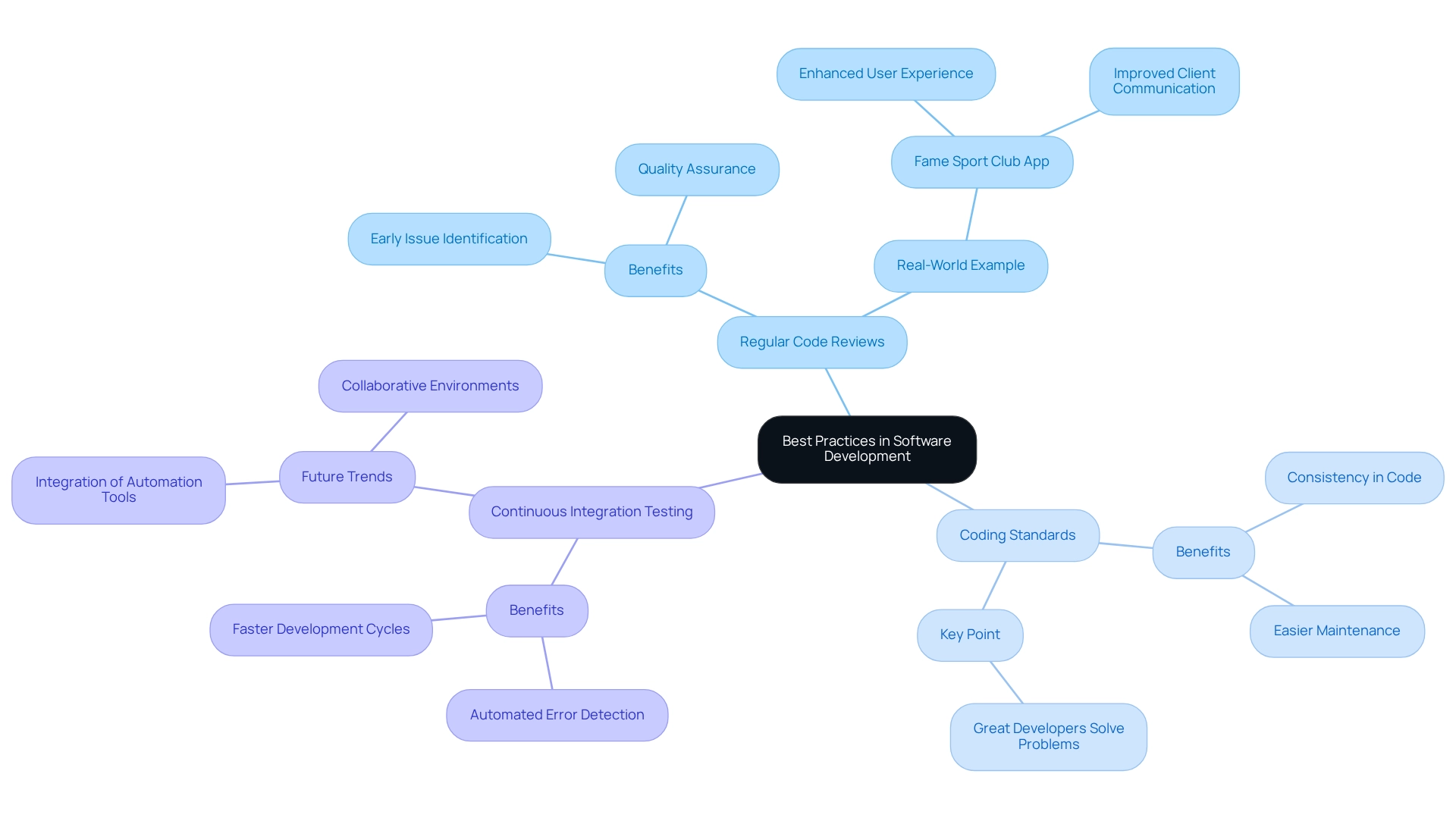
FlippingBook: Utilize Troubleshooting Tips to Resolve Software Errors
Developers often face significant challenges when addressing software errors, which can hinder their productivity and efficiency. However, by adopting effective troubleshooting strategies, they can overcome these obstacles. One key approach is systematic diagnostics, which involves breaking down issues into manageable components to identify root causes more effectively. Furthermore, employing sophisticated debugging tools, such as Kodezi CLI, is essential. These tools offer real-time insights and automate numerous tedious processes, enabling programmers to concentrate on essential problem-solving activities. The AI-driven functionalities facilitate automatic code correction and bug examination, optimizing the debugging procedure and improving overall productivity. Similarly, the CLI enhances team productivity by auto-healing codebases, ensuring that developers can resolve issues swiftly and efficiently.
In addition to these strategies, maintaining clear and comprehensive documentation is crucial. It aids in tracking changes and understanding code evolution while serving as a valuable resource during troubleshooting. By documenting known issues and their resolutions, teams can build a knowledge base that accelerates future debugging efforts.
Real-world examples illustrate the success of these systematic approaches. For instance, the case study titled 'FlippingBook: Utilize Troubleshooting Tips to Resolve Software Errors' demonstrates how teams have leveraged the platform's unique capabilities to improve their coding practices. Unlike competitors such as Copilot, which mainly concentrate on autocomplete functions, Kodezi serves as an autocorrect for code, enabling users to automatically debug and resolve coding problems efficiently. This makes Kodezi an invaluable tool for programmers across all industries, whether they are just getting started or are seasoned professionals seeking optimization. Why not explore the tools available on the platform and see how they can enhance your coding practices?
Software Testing Stuff: Conduct Comprehensive Testing to Eliminate Software Errors
Thorough testing is essential for eliminating software errors, which includes various approaches such as unit testing, integration testing, and user acceptance testing. By utilizing a diverse range of testing techniques, programmers can significantly enhance the durability and reliability of their software, ultimately improving user experience and minimizing software errors.
Unit testing specifically focuses on individual components of the software to ensure that each part functions correctly in isolation, thereby reducing the occurrence of software errors. This approach is crucial for the early detection of bugs, allowing developers to pinpoint issues before they escalate. Conversely, integration testing assesses how different components interact, which is vital for identifying errors that may arise from module interactions. The combination of these two testing strategies lays a strong foundation for detecting software errors and ensuring reliability.
Statistics indicate that only 18% of teams currently engage in test-driven development (TDD), highlighting a considerable gap in present practices and an opportunity for enhancement in testing methodologies. As trends in application testing evolve, there is a noticeable shift towards more integrated, collaborative, and automated strategies that emphasize early detection of software errors and comprehensive validation. This transition underscores the need for QA teams to adopt advanced bug tracking tools, which assist in identifying and resolving software errors while maintaining secure dependencies throughout the development lifecycle.
Real-world examples illustrate the impact of unit and integration testing on application reliability. For instance, a case study revealed that 44% of QA teams encountered challenges with early project participation, which impeded their ability to manage test environments effectively. By enhancing the integration of QA teams within the project lifecycle, organizations can foster better collaboration and efficiency, ultimately leading to a reduction in software errors.
As the digital landscape continues to expand, the incorporation of new test cycles becomes increasingly vital to address potential software errors. Professional insights emphasize that comprehensive testing methodologies are not merely advantageous but essential for eradicating errors in applications. By prioritizing unit and integration testing, developers can ensure their software is free from software errors and adheres to the highest quality and reliability standards. To implement these strategies effectively, teams should consider adopting advanced bug tracking tools and nurturing a culture of collaboration within their development processes.
Conclusion
In the fast-paced world of software development, developers often grapple with numerous coding challenges. Embracing advanced debugging and testing tools, such as Kodezi, is essential for those striving to enhance code quality and productivity. Kodezi's automated debugging capabilities and comprehensive testing strategies empower teams to swiftly identify and rectify errors, fostering a culture of quality in software development. With the potential to reduce software errors by up to 30% and improve overall code reliability, Kodezi proves to be an invaluable asset in modern development environments.
Furthermore, integrating real-time error monitoring and adopting best practices—such as regular code reviews and adherence to coding standards—significantly mitigates risks associated with software development. Tools like Bugsnag and Raygun complement Kodezi's offerings by providing real-time insights and performance monitoring, ensuring that critical issues are addressed promptly before they escalate.
Ultimately, the proactive approach of leveraging automated tools and methodologies not only enhances coding practices but also leads to more robust and reliable software solutions. As the software development landscape evolves, embracing these innovative strategies will be crucial for teams aiming to deliver exceptional user experiences and maintain a competitive edge in the industry. Developers are encouraged to explore the capabilities of Kodezi and similar tools to unlock their full potential in error prevention and quality assurance.
Frequently Asked Questions
What is Kodezi and how does it help developers?
Kodezi is a platform that offers automated code debugging capabilities, allowing developers to quickly identify and resolve issues within their codebases. It provides thorough clarifications of issues and solutions, helping developers learn from mistakes and improve their coding techniques.
How does Kodezi improve code quality and productivity?
Kodezi conserves valuable time and significantly elevates overall code quality by reducing software errors. Research indicates that automated debugging tools can decrease program mistakes by as much as 30%. Teams using Kodezi have reported notable enhancements in productivity and code dependability.
What are the benefits of using Kodezi's CLI tool?
Kodezi's CLI tool, often referred to as the Swiss-Army Knife for developers, enhances productivity and code reliability by enabling quick issue resolution and adherence to security best practices and coding standards.
How can developers get started with Kodezi?
Developers can integrate Kodezi into their workflow by checking out the 5-minute quickstart guide and exploring a demo to understand how Kodezi can revolutionize their coding practices.
What challenges do developers face that Kodezi addresses?
Developers often face significant coding challenges, particularly in monitoring and resolving application issues. Kodezi addresses these by providing AI-driven automated testing capabilities that identify bugs early in the development cycle and enhance codebases proactively.
Why is early bug detection important in software development?
Early bug detection is essential for maintaining high standards in application development, as it helps prevent software errors, conserves resources, and ensures application longevity.
How does Kodezi align with current industry trends?
Kodezi aligns with industry trends by empowering engineering teams to prioritize automation and integrate testing into their DevOps or SRE workflows, which is increasingly important for minimizing software errors.
What does research say about the effectiveness of automated debugging tools?
Research shows that organizations using real-time error monitoring tools experience a 70% improvement in application reliability, highlighting the significance of automated debugging tools like Kodezi in enhancing software quality.




